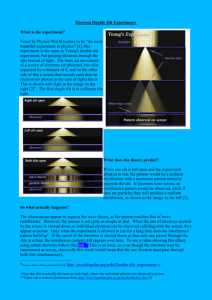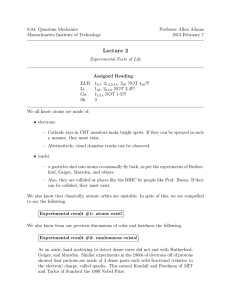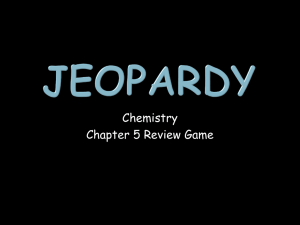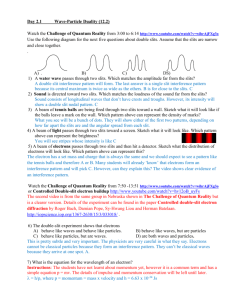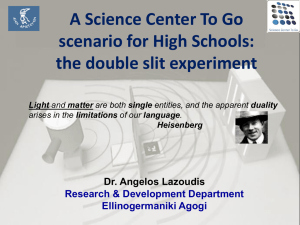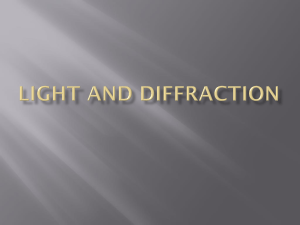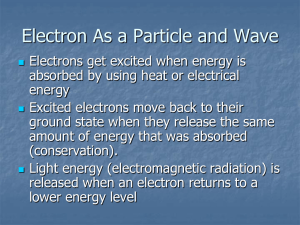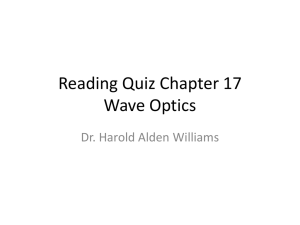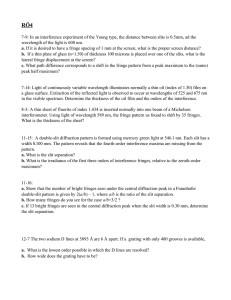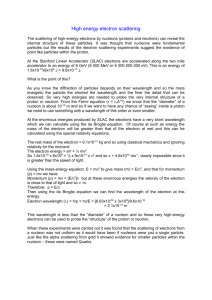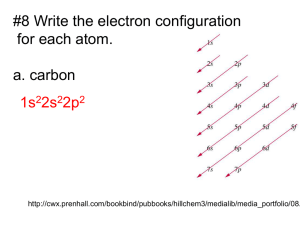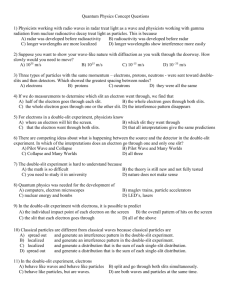here
advertisement
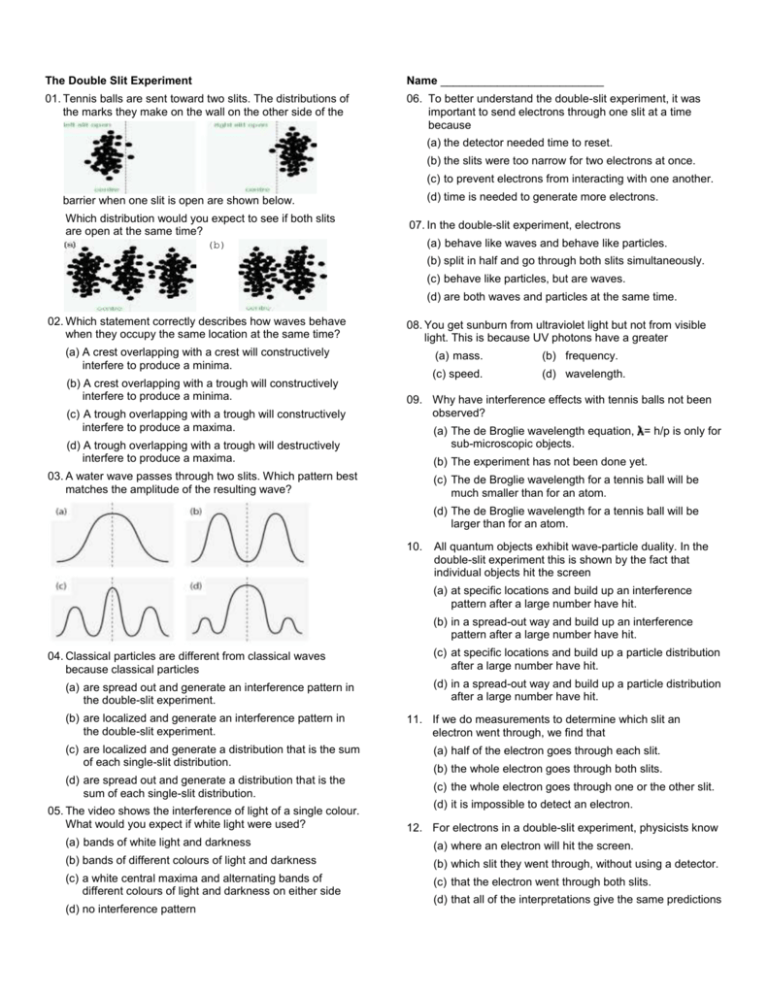
The Double Slit Experiment Name __________________________ 01. Tennis balls are sent toward two slits. The distributions of the marks they make on the wall on the other side of the 06. To better understand the double-slit experiment, it was important to send electrons through one slit at a time because (a) the detector needed time to reset. (b) the slits were too narrow for two electrons at once. (c) to prevent electrons from interacting with one another. (d) time is needed to generate more electrons. barrier when one slit is open are shown below. Which distribution would you expect to see if both slits are open at the same time? 07. In the double-slit experiment, electrons (a) behave like waves and behave like particles. (b) (b) split in half and go through both slits simultaneously. (c) behave like particles, but are waves. (d) are both waves and particles at the same time. 02. Which statement correctly describes how waves behave when they occupy the same location at the same time? 08. You get sunburn from ultraviolet light but not from visible light. This is because UV photons have a greater (a) A crest overlapping with a crest will constructively interfere to produce a minima. (b) A crest overlapping with a trough will constructively interfere to produce a minima. (c) A trough overlapping with a trough will constructively interfere to produce a maxima. (a) mass. (b) frequency. (c) speed. (d) wavelength. 09. Why have interference effects with tennis balls not been observed? (a) The de Broglie wavelength equation, = h/p is only for sub-microscopic objects. (d) A trough overlapping with a trough will destructively interfere to produce a maxima. (b) The experiment has not been done yet. 03. A water wave passes through two slits. Which pattern best matches the amplitude of the resulting wave? (c) The de Broglie wavelength for a tennis ball will be much smaller than for an atom. (d) The de Broglie wavelength for a tennis ball will be larger than for an atom. 10. All quantum objects exhibit wave-particle duality. In the double-slit experiment this is shown by the fact that individual objects hit the screen (a) at specific locations and build up an interference pattern after a large number have hit. (b) in a spread-out way and build up an interference pattern after a large number have hit. 04. Classical particles are different from classical waves because classical particles (a) are spread out and generate an interference pattern in the double-slit experiment. (b) are localized and generate an interference pattern in the double-slit experiment. (c) at specific locations and build up a particle distribution after a large number have hit. (d) in a spread-out way and build up a particle distribution after a large number have hit. 11. If we do measurements to determine which slit an electron went through, we find that (c) are localized and generate a distribution that is the sum of each single-slit distribution. (a) half of the electron goes through each slit. (d) are spread out and generate a distribution that is the sum of each single-slit distribution. (c) the whole electron goes through one or the other slit. 05. The video shows the interference of light of a single colour. What would you expect if white light were used? (b) the whole electron goes through both slits. (d) it is impossible to detect an electron. 12. For electrons in a double-slit experiment, physicists know (a) bands of white light and darkness (a) where an electron will hit the screen. (b) bands of different colours of light and darkness (b) which slit they went through, without using a detector. (c) a white central maxima and alternating bands of different colours of light and darkness on either side (c) that the electron went through both slits. (d) no interference pattern (d) that all of the interpretations give the same predictions 13. There are competing ideas about what is actually happening between the source and the detector in the double-slit experiment. In which of the interpretations does a single electron go through one and only one slit? (a) Pilot Wave and Collapse (b) Pilot Wave and Many Worlds (c) Collapse and Many Worlds (d) Pilot Wave, Collapse, and Many Worlds 14. An electron microscope can produce clearer images of significantly smaller objects than a light microscope can because the electrons have a (a) larger frequency. (b) smaller size. (c) slower speed. (d) shorter wavelength. 21. It is harder to see interference with buckyballs than electrons because buckyballs (a) are neutral and harder to accelerate (b) have smaller wavelengths (c) have bigger wavelengths (d) are bigger and need bigger slits 22. Suppose you want to show your wave-like nature with diffraction as you walk through the doorway. How slowly would you need to move? (a) 1035 m/s (b) 1015 m/s (c) 10-15 m/s (d) 10 -35 m/s 23. Physicists working with radar treat light as a wave and physicists working with gamma radiation from nuclear energy treat light as particles. This is because (a) radar was developed decades before nuclear power 15. Which quantum application has had the greatest effect on your life? (a) solar panels (b) transistors (b) longer wavelengths show interference more easily (c) longer wavelengths are more localized 24. Physicists have concluded that electrons and photons are (c) lasers (a) waves (b) particles (d) other (c) both (d) neither 16. Light also behaves like a particle in 25. If you compare a red LED to a blue LED, the red light (a) rectilinear propagation (a) is brighter (b) travel in a vacuum (c) has less energy/photon (c) both of the above d) has a smaller wavelength b) is dimmer (d) neither of the above 26. The double-slit experiment is hard to understand because 17. Light also behaves like a wave in (a) the math is so difficult (a) polarization (b) the theory is still new and not fully tested (b) dispersion (c) you need to study it in university (c) both of the above (d) nature does not make sense (d) neither of the above 27. Wave-particle duality will be better understood 18. Most physicists think that the double-slit experiment (a) after more experiments have been done (a) is fully understood (b) after a better theory is devised (b) will soon be understood (c) after we get used to it (c) will never be fully understood (d) it never will be understood (d) doesn’t need to be understood 19. It is easier to see an interference pattern if the electrons (a) travel slower (b) travel faster (c) speed has no effect on the pattern 20. Quantum physics was needed for the development of 28. Three good LED’s – infrared, red and blue were attached one by one to a battery. One of them didn’t light up. It was the (a) infrared (b) red (c) blue 29. Three types of particles with the same momentum – electrons, protons, neutrons - were sent toward double-slits and then detectors. Which showed the greatest spacing between nodes? (a) computers, electron microscopes (a) electrons (b) protons (b) maglev trains, particle accelerators (c) neutrons (d) they all had the same (c) nuclear energy and bombs (d) LED’s, lasers
